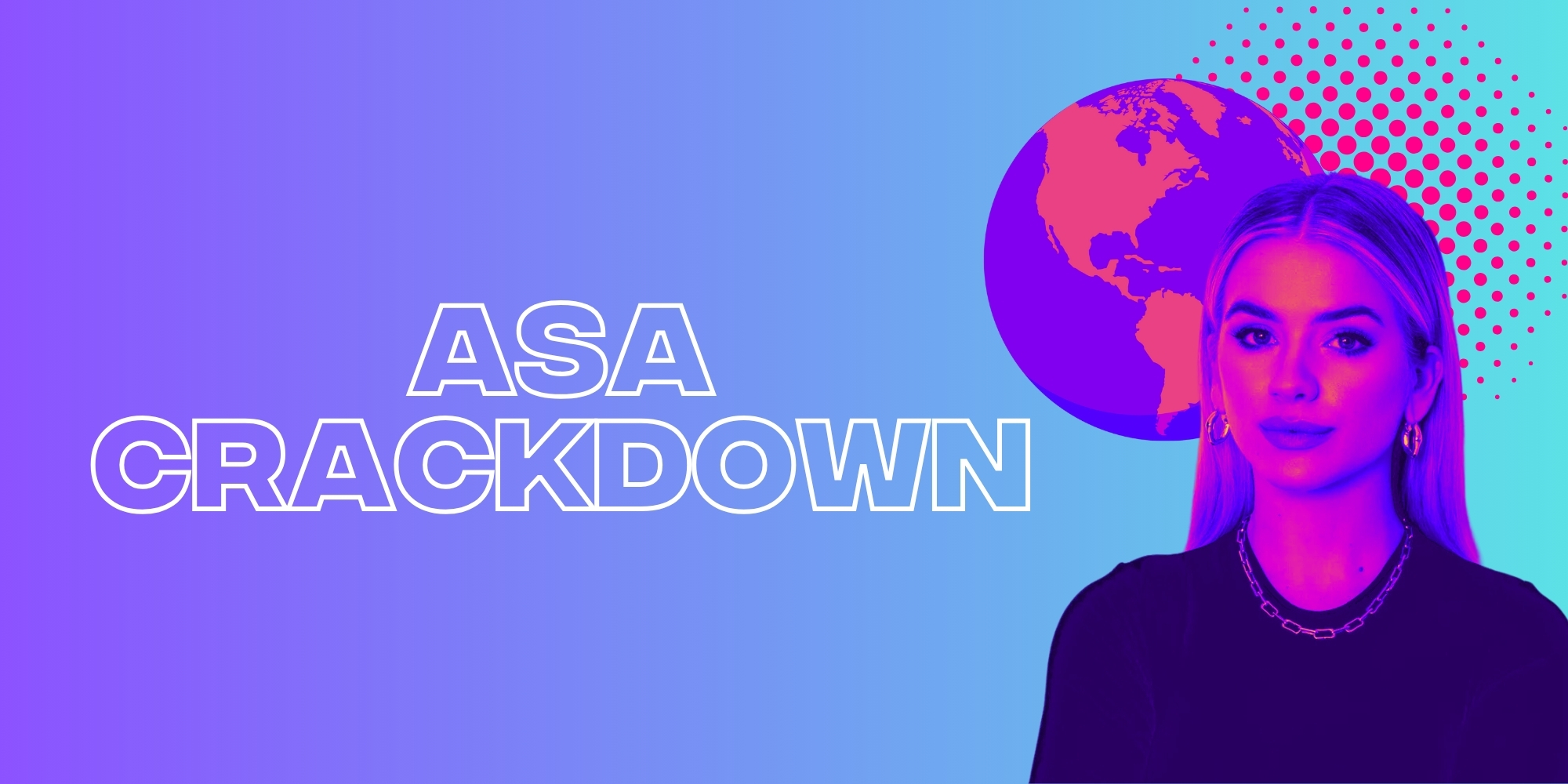The ASA Is Cracking Down on Social Media Advertising Laws, Here’s What You Need To Know
Jul 16, 2024
Social Media Marketing News

The Advertising Standards Authority is having a major crackdown on social media advertising laws, with a particular emphasis on Greenwashing.
Fears of Greenwashing have spread throughout the marketing community, with consumers making it clear that they will not stand for misleading green claims.
How is the ASA planning to carry out its threats, and how do these social media advertising laws impact your brand?
Read on to find out more.
THE ASA AND SOCIAL MEDIA ADVERTISING LAWS
The ASA’s current focus on misleading environmental claims is part of a broader, global shift towards harsher social media advertising laws for Greenwashing.
With the climate crisis worsening year by year, consumers are more focused on what the brands they purchase from are doing to save the planet. In fact, recent studies found that 40% of UK consumers are more likely to purchase a product that is labelled carbon neutral, and 29% are willing to pay more for these products.
@aliceisgratified Replying to @Nemo IT IS ACTUALLY THAT DEEP. Shady and illegal practice is not tolerated in any industry, so why should we accept it on social media? #influencers #influencermarketing #influencertips #influencermarketingsecrets #futureofinfluencers #postcampaignanalysis
As such, many brands have made climate change a bigger priority in their marketing, in order to keep up with consumer desires. Major brands who previously never uttered a word about climate change, are now preaching about their efforts to become carbon neutral.
Yet, this has led to much controversy in relation to social media advertising laws.
Greenwashing, the act of crafting a false impression of what a company is doing for the environment, has become a major issue in the world of social media advertising laws and marketing. The food industry in particular has come under fire in recent years, with 80% of misleading claims in the food industry relating to climate and carbon offset claims.
As a result, advertising watch dogs such as the UK’s ASA have begun to crackdown on environmental falsehoods that are against social media advertising laws.
May ASA Crackdown
In May of 2023, the ASA announced that it would be banning any and all ads that feature the terms net zero and carbon neutral, unless the involved brands could back up their claims.
This new crackdown was in response to growing concerns about Greenwashing, which led the ASA to catch several food companies in recent years promoting false green claims about their businesses. One such claim that is popular amongst brands, is carbon offsetting.
@fifthwallvc The question on everyone’s mind #fifthwall #climate #climatechange #carbon #carbonoffset #offset
Carbon offsetting is a tool to offset carbon emissions and debts by funding environmental projects. It is incredibly popular amongst airlines and oil giants, and has recently risen in use amongst food based brands as well.
Yet, many critics have made it clear that it is often used as a means of distracting consumers from the bigger changes companies need to make for long term, sustainable net zero goals.
These mounting Greenwashing concerns about the truth behind carbon offsetting were made much more severe when a recent study highlighted the gap in understanding between brands and consumers.
The ASA was shocked to find that consumers do not have a comprehensive understanding of what terms such as carbon offsetting and carbon neutral truly mean. The study found that many consumers believed carbon offsetting includes a company reducing its actual carbon emissions, when this is far from the truth. Consumers involved in the study felt that they had been misled when they were informed of the true meaning of these terms.
@nrdc.org You’re welcome #sustainability #sustainableliving #sustainabilitytiktok #greenwashing
As such, the ASA was pushed to create stricter standards when it comes to using these terms, to ensure that consumers are not being misled by advertising and are protected by social media advertising laws.
To do so, the ASA has been monitoring claims in ads and attempting to create a solid criteria for the evidence brands must show. A significant piece of the puzzle is that many of the terms in question do not have governable definitions. If these terms do not have an official definition, then the ASA cannot protect consumers from businesses misusing them.
Consumers have been vocal in their desire for terms and schemes such as carbon neutrality to have globally agreed upon definitions. However, this is ultimately up to legislative bodies, not the ASA.
Thus, for now, the ASA has sworn to keep a close eye on environmental net zero claims that are unfounded and breach existing rules. It is essential that they do so, to ensure that brands are open and honest with their consumers.
Issues of consumers feeling misled by brands has become a mounting issue in the world of social media advertising laws, with several cases in recent years causing major. One such case that has served as not only proof of consumer desire for transparency from brands, but also a warning to businesses everywhere, is the Grace Beverley incident.
The Grace Beverly Case
In May of 2024, influencer Grace Beverly broke social media advertising rules with six posts promoting her own brand, in a now infamous case.
An excellent example of just how essential brand honesty and transparency are to modern consumers, Grace Beverly faced controversy earlier this year when she was forced to remove several posts from her account.
Beverly shared two reels and four TikToks in October of 2023 which promoted a coat from Tala, her own fashion brand. The content was not clearly labelled as advertisements, leading to the ASA forcing her to remove the posts.
@aliceisgratified Today was a landmark and precedent-setting day for Influencer-led business marketing disclosure #asa #addisclosure #influencermarketing #influencerindustry #creatorcommunity
Tala claimed that Beverly is synonymous with the brand and that her followers are very aware of this. However, the ASA stated that they received more than 50 complaints about the posts being misleading.
It ruled that as users had to watch through the videos to find out they were ads, or click through to Beverley’s profile to confirm her connection with the brand, that the posts did not have sufficient disclosure of their intent to market. Therefore, they were in direct violation of social media advertising laws.
The incident resulted in immense backlash from consumers, with both Beverley and her brand Tala having to scramble to rebuild trust. Modern consumers value honesty and transparency above all else, hence an issue such as this can be devastating for a brand.
Several months on, one can still find ample articles and forums discussing the case, with consumers explaining how they felt duped by the brand and misled.
Whilst not an example of Greenwashing, the Beverley case highlights how essential it is for brands to practise honesty and abide by social media advertising laws.
SOCIAL MEDIA ADVERTISING LAWS AND YOUR BRAND
Ultimately, marketers and brands must be extremely careful with their environmental claims.
Greenwashing is a hot global issue, with watch dogs across the world doubling down on their enforcement. Brands must ensure that their claims are truthful and supported by ample evidence; not only to protect themselves from organisations such as the ASA, but to practise transparency and honesty with their consumers.
Instances such as the Grace Beverly case emphasise the importance of brand honesty. Modern consumers desire transparency, morality, and good values from the brands they engage with. Green efforts must be earnest, or brands risk losing their good standing with their target audiences.
All in all, including planet focused efforts in your business is not only a fantastic way to connect with modern, eco-minded audiences, but to do your bit for the planet.
Yet, proceed with caution. Consumers and advertising watch dogs such as the ASA are waiting at every turn to call your bluff.
As always, honesty is the best policy.
Our influencer marketing agency and social agency are located worldwide, with our agency network based in the USA, UK, UAE and China.
If you want to find industry insights, visit our influencer marketing and social media blogs.
@sociallypowerful
Social And Influencer Marketing News + Insights
Get in touch
We'll show you how to start powerful conversation, drive social engagement, build your brand, hit sales targets or meet other goals you have, wherever you are in the world.
Work with us





